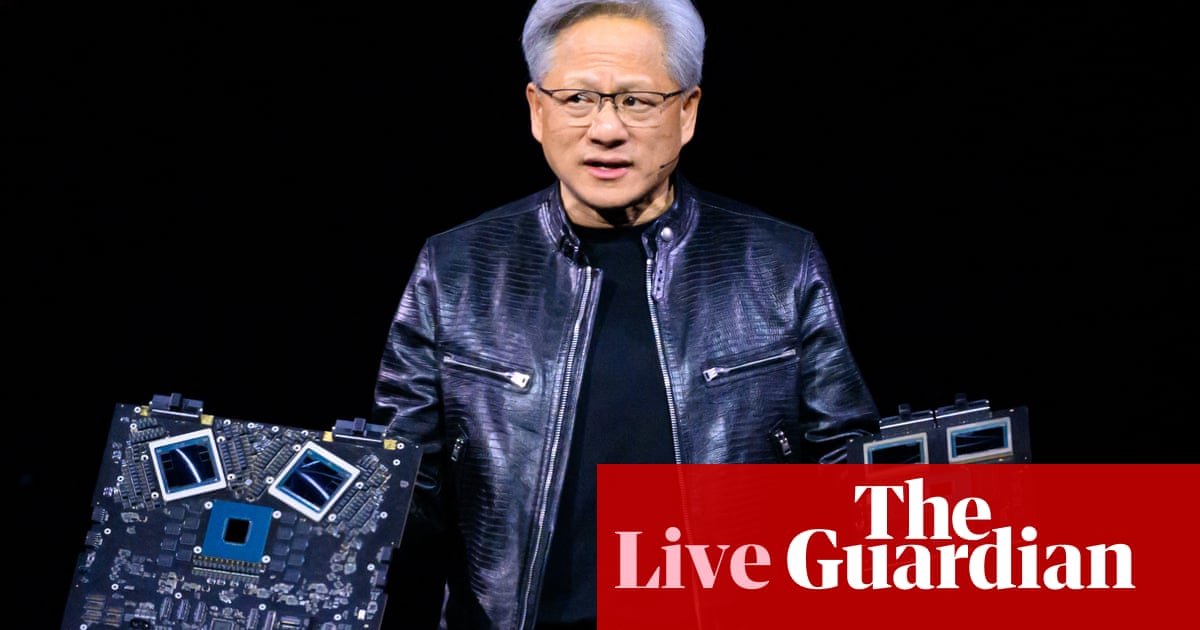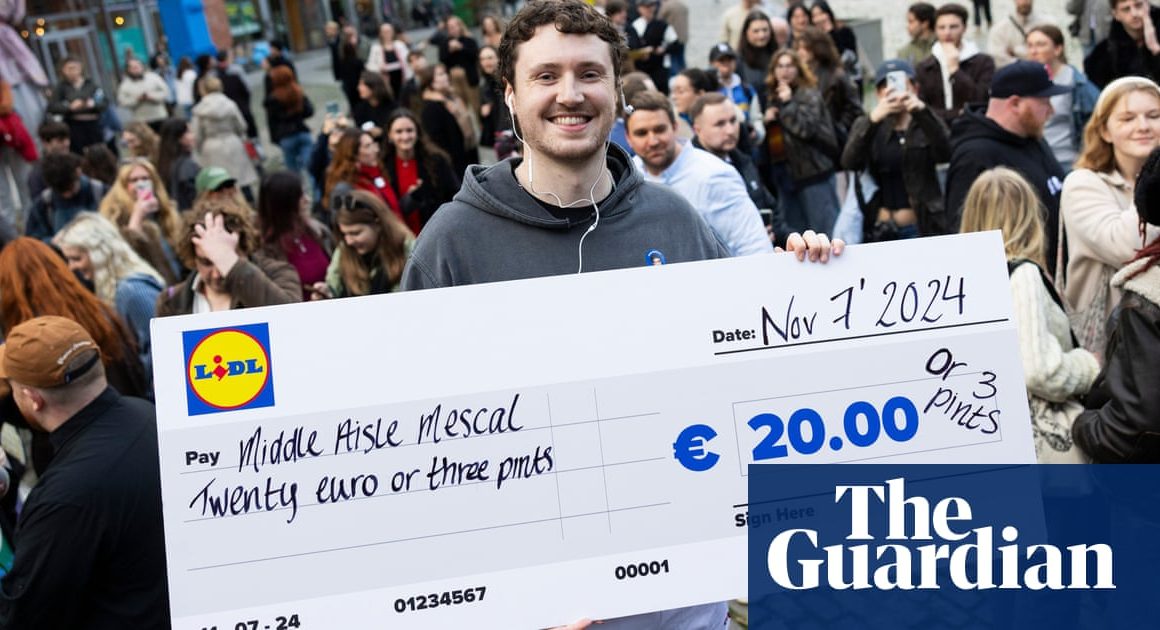Key events
Drax to pay £25m fine for inaccurate data on source of wood for controversial generator

Kalyeena Makortoff
The power generator Drax has agreed to pay £25m after the energy industry regulator found submitted inaccurate sustainability data on the sourcing of wood pellets used as its massive plant in North Yorkshire.
The investigation by Ofgem, which was launched last year, concluded that there was “an absence of adequate data governance and controls in place” on the sourcing of wood from Canada between April 2021 the end of March 2022.
Drax, which is the recipient of significant UK government subsidies, has faced continued scrutiny over the sustainability of its wood-burning power generation business.
Around 80% of the wood pellets used in Drax’s biomass plants are sourced from forests in the US and Canada.
Ofgem said there was no evidence to suggest that that the breach was deliberate, saying instead that it was “technical in nature”.
The regulator also said the data ultimately fell outside of the criteria used to determine the amount of public funding that Drax receives and would not impact its government subsidies. At least 70% of biomass has to come from sustainable sources in order for companies to receive government funding.
Drax has agreed to pay £25m towards a voluntary redress scheme to settle the matter, and resubmit its profiling data for Canadian-sourced wood pellets. It will also hire an independent auditor to produce data for its annual biomass report for the year to March.
However, Ofgem’s findings are likely to fuel further criticism around government support for Drax’s and its biomass operations, which have increasingly come under scrutiny from MPs and environmental campaigners.
HSBC shuffles bosses ahead of new chief executive’s start
HSBC’s new boss Georges Elhedery will not start his new job officially until Monday, but it looks like the customary reshuffle at the top under a new chief executive is already underway.
Elhedery, who is still technically the UK-listed bank’s chief financial officer until then, is replacing Noel Quinn, who in April made the unexpected announcement that he was stepping down after an “intense” five years in charge.
Here is what we have learned today about the jostling behind the scenes (via a statement from the bank reported Reuters). The resignation of Nuno Matos in particular is interesting: he was seen as a potential candidate to take the top chief executive job.
Out:
-
HSBC chief executive of wealth and personal banking Nuno Matos will resign.
-
John Hinshaw, HSBC group chief operating officer, has also decided to leave the group to pursue other opportunities.
In:
-
Stuart Riley is appointed to the expanded HSBC global chief information officer role, which will assume responsibility for data and innovation.
-
Suzy White, HSBC global banking and markets chief operating officer, has been appointed global chief operating officer on an interim basis.
European stock markets are basically unmoved this morning, despite the money on the move in the US after Nvidia’s results.
A reminder that we are still just about in August, when much of the investment world takes a holiday. Of course, that can lead to dramatic volatility as we saw this month.
Today we appear to have the opposite though. In a rare occurrence, none of the major stock market indices have stirred. Here are the opening snaps from Reuters:
-
EUROPE’S STOXX 600 FLAT
-
BRITAIN’S FTSE 100 FLAT; GERMANY’S DAX FLAT
-
FRANCE’S CAC 40 FLAT; SPAIN’S IBEX FLAT
-
EURO STOXX INDEX FLAT; EURO ZONE BLUE CHIPS FLAT
Nvidia shares down 7% pre-market; UK car production falls 14%
Good morning, and welcome to our live coverage of business, economics and financial markets.
Nvidia shares are down 7% in after-hours trading despite actually beating analyst expectations for sales and profits.
The Silicon Valley chip designer reported sales more than doubling to $30bn (£23bn), up 122% in the second quarter compared with last year. Analysts had expected sales of $28.7bn on average.
Jensen Huang, founder and chief executive of Nvidia, said anticipation for its forthcoming Blackwell chips – which squeeze in 208bn transistors to carry out the calculations needed to train large language model – was “incredible”, and demand for its current range remained strong. He said:
Nvidia achieved record revenues as global data centers are in full throttle to modernize the entire computing stack with accelerated computing and generative AI.”
So how come shares fell after US trading hours when the company gave every signal that it believes it is still riding the crest of the artificial intelligence (AI) wave?
One might have been the lack of detail on delays that hit Blackwell chip production – although the company suggested those manufacturing issues had been sorted by TSMC, the Taiwan semiconductor manufacturer that builds Nvidia’s most advanced chips.
But another may be that the company’s growth has been so enormous that it needs to not just beat expectations to rise further, but smash them.
Henry Allen, a strategist at Deutsche Bank, said:
Although the results slightly beat expectations, their share price was down around -7% in after-hours trading, partly because it fell short of some estimates that had been looking for an even stronger release. For instance, the revenue outperformance was the smallest relative to expectations in six quarters, so this wasn’t the sort of massive beat that Nvidia has often reported over the last 18 months.
At the same time, the Q3 revenue guidance came in a touch above the average estimate ($32.5bn vs $31.9bn est.) but still well within the range of analysts’ views.
UK car production slips as carmakers prepare for new models
Back in the UK, car manufacturing numbers are down, but only as companies switch production to new models, according to the Society of Motor Manufacturers and Traders (SMMT).
The lobby group said that production dropped 14.4% in July “as model changeovers and temporary supply chain constraints restrict output”.
One of those new models is likely to be the electric Range Rover, the first electric car to be built in Britain by Jaguar Land Rover, the UK’s biggest manufacturer. Its only other electric model, the Jaguar I-Pace, is built by a contract manufacturer in Austria.
The industry produced 482,000 cars in the first seven months of the year, down 9% from 2023. The SMMT is hoping that annual production will rise above 1m cars next year as new models start production.
Mike Hawes, chief executive of the SMMT, said
Following significant growth last year, some readjustment in output was to be expected. Indeed, an ongoing degree of volatility is likely as the industry restructures to transition to zero emission vehicle production.
As the billions already committed to new models start to deliver a return, volume growth will resume, providing we seize every opportunity to enhance our global competitiveness.
The agenda
-
10am BST: Eurozone consumer confidence (August; -13 point; consensus: -13.4)
-
10:15am BST: European Central Bank speech by chief economist Philip Lane in Frankfurt
-
1pm BST: Germany inflation rate (August; prev.:2.3% annualised; cons.: 2.1%)
-
1:30pm BST: US GDP second estimate (second quarter; prev.: 1.4% annualised; cons.: 2.8%)











